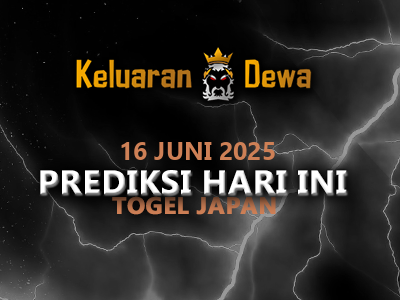Prediksi Keluaran Taiwan Selasa 17 Juni 2025 Terjitu Prediksi Keluaran Dewa Togel Taiwan Hari Ini Selasa 17-06-2025 yang terjitu ini akan di bocorkan oleh team Keluaran Dewa. Ini adalah racikan angka keluar togel yang telah dirumuskan secara teliti oleh para ahlinya. Angka yang telah direkap oleh team kami m […]
Prediksi Keluaran Mongolia Selasa 17 Juni 2025 Terjitu
Prediksi Keluaran Mongolia Selasa 17 Juni 2025 Terjitu Prediksi Keluaran Dewa Togel Mongolia Hari Ini Selasa 17-06-2025 yang terjitu ini akan di bocorkan oleh team Keluaran Dewa. Ini adalah racikan angka keluar togel yang telah dirumuskan secara teliti oleh para ahlinya. Angka yang telah direkap oleh team ka […]
Prediksi Keluaran Singapore Rabu 18 Juni 2025 Terjitu
Prediksi Keluaran Singapore Rabu 18 Juni 2025 Terjitu Prediksi Keluaran Dewa Togel SGP Hari Ini Rabu 18-06-2025 yang terjitu ini akan di bocorkan oleh team Keluaran Dewa. Ini adalah racikan angka keluar togel yang telah dirumuskan secara teliti oleh para ahlinya. Angka yang telah direkap oleh team kami memun […]
Prediksi Keluaran Japan Selasa 17 Juni 2025 Terjitu
Prediksi Keluaran Japan Selasa 17 Juni 2025 Terjitu Prediksi Keluaran Dewa Togel Jepang Hari Ini Selasa 17-06-2025 yang terjitu ini akan di bocorkan oleh team Keluaran Dewa. Ini adalah racikan angka keluar togel yang telah dirumuskan secara teliti oleh para ahlinya. Angka yang telah direkap oleh team kami me […]
Prediksi Keluaran China Selasa 17 Juni 2025 Terjitu
Prediksi Keluaran China Selasa 17 Juni 2025 Terjitu Prediksi Keluaran Dewa Togel China Hari Ini Selasa 17-06-2025 yang terjitu ini akan di bocorkan oleh team Keluaran Dewa. Ini adalah racikan angka keluar togel yang telah dirumuskan secara teliti oleh para ahlinya. Angka yang telah direkap oleh team kami mem […]
Prediksi Keluaran Sydney Selasa 17 Juni 2025 Terjitu
Prediksi Keluaran Sydney Selasa 17 Juni 2025 Terjitu Prediksi Keluaran Dewa Togel Sydney Hari ini Selasa 17-06-2025 yang terjitu ini akan dibocorkan oleh team Keluaran Dewa. Ini adalah racikan angka keluar togel yang telah dirumuskan secara teliti oleh para ahlinya. Angka yang telah direkap oleh team kami me […]
Prediksi Keluaran Cambodia Selasa 17 Juni 2025 Terjitu
Prediksi Keluaran Cambodia Selasa 17 Juni 2025 Terjitu Prediksi Keluaran Dewa Togel Kamboja Hari Ini Selasa 17-06-2025 yang terjitu ini akan di bocorkan oleh team Keluaran Dewa. Ini adalah racikan angka keluar togel yang telah dirumuskan secara teliti oleh para ahlinya. Angka yang telah direkap oleh team kam […]
Prediksi Keluaran Hongkong Senin 16 Juni 2025 Terjitu
Prediksi Keluaran Hongkong Senin 16 Juni 2025 Terjitu Prediksi Keluaran Dewa Togel HK Hari Ini Senin 16-06-2025 yang terjitu ini akan di bocorkan oleh team Keluaran Dewa. Ini adalah racikan angka keluar togel yang telah dirumuskan secara teliti oleh para ahlinya. Angka yang telah direkap oleh team kami memun […]
Prediksi Keluaran Taiwan Senin 16 Juni 2025 Terjitu
Prediksi Keluaran Taiwan Senin 16 Juni 2025 Terjitu Prediksi Keluaran Dewa Togel Taiwan Hari Ini Senin 16-06-2025 yang terjitu ini akan di bocorkan oleh team Keluaran Dewa. Ini adalah racikan angka keluar togel yang telah dirumuskan secara teliti oleh para ahlinya. Angka yang telah direkap oleh team kami mem […]
Prediksi Keluaran Mongolia Senin 16 Juni 2025 Terjitu
Prediksi Keluaran Mongolia Senin 16 Juni 2025 Terjitu Prediksi Keluaran Dewa Togel Mongolia Hari Ini Senin 16-06-2025 yang terjitu ini akan di bocorkan oleh team Keluaran Dewa. Ini adalah racikan angka keluar togel yang telah dirumuskan secara teliti oleh para ahlinya. Angka yang telah direkap oleh team kami […]
Prediksi Keluaran Singapore Senin 16 Juni 2025 Terjitu
Prediksi Keluaran Singapore Senin 16 Juni 2025 Terjitu Prediksi Keluaran Dewa Togel SGP Hari Ini Senin 16-06-2025 yang terjitu ini akan di bocorkan oleh team Keluaran Dewa. Ini adalah racikan angka keluar togel yang telah dirumuskan secara teliti oleh para ahlinya. Angka yang telah direkap oleh team kami mem […]
Prediksi Keluaran Japan Senin 16 Juni 2025 Terjitu
Prediksi Keluaran Japan Senin 16 Juni 2025 Terjitu Prediksi Keluaran Dewa Togel Jepang Hari Ini Senin 16-06-2025 yang terjitu ini akan di bocorkan oleh team Keluaran Dewa. Ini adalah racikan angka keluar togel yang telah dirumuskan secara teliti oleh para ahlinya. Angka yang telah direkap oleh team kami memu […]
Prediksi Keluaran China Senin 16 Juni 2025 Terjitu
Prediksi Keluaran China Senin 16 Juni 2025 Terjitu Prediksi Keluaran Dewa Togel China Hari Ini Senin 16-06-2025 yang terjitu ini akan di bocorkan oleh team Keluaran Dewa. Ini adalah racikan angka keluar togel yang telah dirumuskan secara teliti oleh para ahlinya. Angka yang telah direkap oleh team kami memun […]
Prediksi Keluaran Sydney Senin 16 Juni 2025 Terjitu
Prediksi Keluaran Sydney Senin 16 Juni 2025 Terjitu Prediksi Keluaran Dewa Togel Sydney Hari ini Senin 16-06-2025 yang terjitu ini akan dibocorkan oleh team Keluaran Dewa. Ini adalah racikan angka keluar togel yang telah dirumuskan secara teliti oleh para ahlinya. Angka yang telah direkap oleh team kami memu […]
Prediksi Keluaran Cambodia Senin 16 Juni 2025 Terjitu
Prediksi Keluaran Cambodia Senin 16 Juni 2025 Terjitu Prediksi Keluaran Dewa Togel Kamboja Hari Ini Senin 16-06-2025 yang terjitu ini akan di bocorkan oleh team Keluaran Dewa. Ini adalah racikan angka keluar togel yang telah dirumuskan secara teliti oleh para ahlinya. Angka yang telah direkap oleh team kami […]
Prediksi Keluaran Hongkong Minggu 15 Juni 2025 Terjitu
Prediksi Keluaran Hongkong Minggu 15 Juni 2025 Terjitu Prediksi Keluaran Dewa Togel HK Hari Ini Minggu 15-06-2025 yang terjitu ini akan di bocorkan oleh team Keluaran Dewa. Ini adalah racikan angka keluar togel yang telah dirumuskan secara teliti oleh para ahlinya. Angka yang telah direkap oleh team kami mem […]
Prediksi Keluaran Taiwan Minggu 15 Juni 2025 Terjitu
Prediksi Keluaran Taiwan Minggu 15 Juni 2025 Terjitu Prediksi Keluaran Dewa Togel Taiwan Hari Ini Minggu 15-06-2025 yang terjitu ini akan di bocorkan oleh team Keluaran Dewa. Ini adalah racikan angka keluar togel yang telah dirumuskan secara teliti oleh para ahlinya. Angka yang telah direkap oleh team kami m […]
Prediksi Keluaran Mongolia Minggu 15 Juni 2025 Terjitu
Prediksi Keluaran Mongolia Minggu 15 Juni 2025 Terjitu Prediksi Keluaran Dewa Togel Mongolia Hari Ini Minggu 15-06-2025 yang terjitu ini akan di bocorkan oleh team Keluaran Dewa. Ini adalah racikan angka keluar togel yang telah dirumuskan secara teliti oleh para ahlinya. Angka yang telah direkap oleh team ka […]
Prediksi Keluaran Singapore Minggu 15 Juni 2025 Terjitu
Prediksi Keluaran Singapore Minggu 15 Juni 2025 Terjitu Prediksi Keluaran Dewa Togel SGP Hari Ini Minggu 15-06-2025 yang terjitu ini akan di bocorkan oleh team Keluaran Dewa. Ini adalah racikan angka keluar togel yang telah dirumuskan secara teliti oleh para ahlinya. Angka yang telah direkap oleh team kami m […]
Prediksi Keluaran Japan Minggu 15 Juni 2025 Terjitu
Prediksi Keluaran Japan Minggu 15 Juni 2025 Terjitu Prediksi Keluaran Dewa Togel Jepang Hari Ini Minggu 15-06-2025 yang terjitu ini akan di bocorkan oleh team Keluaran Dewa. Ini adalah racikan angka keluar togel yang telah dirumuskan secara teliti oleh para ahlinya. Angka yang telah direkap oleh team kami me […]




















